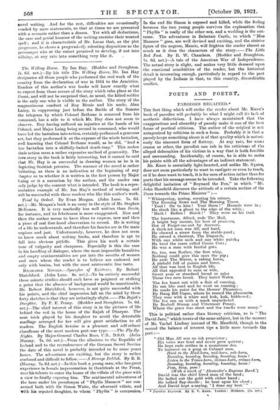The Willing IIorse. By Ian Hay. (Hodder and Stoughton. Is.
6d. net.)—By his title The Willing Horse, Mr. Ian Hay designates all those people who performed the real work of the country from the declaration of war in 1914 to the Armistice. Readers of this author's war books will know exactly what to expect from those scenes of the story which take place at the Front, and will not be surprised that, as usual, the kilted soldier is the only one who is visible to the author. The story of the magnanimous conduct of Roy Birnie and his uncle, Alan Laing, in suppressing just before the Battle of the Somme the telegram by which Colonel Bethune is removed from his command, has a side to it which Mr. Hay does not seem to observe. Roy having suffered an injustice at the hands of his Colonel, and Major Laing being second in command, who would have led the battalion into action, certainly performed a generous act, but they performed it at the expense of the whole battalion, well knowing that Colonel Bethune would, as he did, " lead a ine battalion into a skilfully-baited death-trap." This makes their action seem a rather expensive method of generosity. The love story in the book is fairly interesting, but it cannot be said that Mr. Hay is as successful in drawing women as he is in depicting Scottish privates. The manner of the novel is rather `,rritating, as there is no indication at the beginning of any .thapter as to whether it is written in the first person by Major Laing or is a narration by the author, and the reader can only judge by the context what is intended. The book is a repre- sentative example of Mr. Ian Hay's method of writing, and will be successful with those readers who like this author's work.






































 Previous page
Previous page